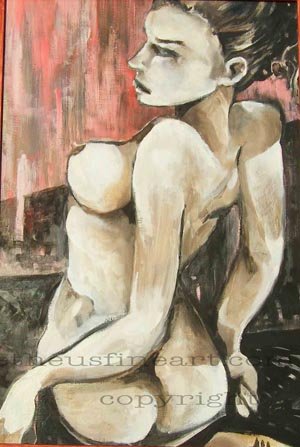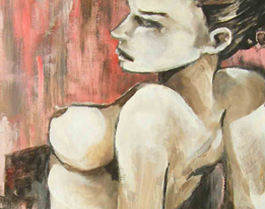UPDATE: NCAC sends a letter to Temecula Mayor, Jeff Comerchero, regarding the city's exhibition policies for public spaces. NCAC strongly encourages Temecula to develop policies recognizing the free expression rights of artists and patrons.
Temecula has issued an apology to artist Jeff Hebron for removing his artwork and is drafting new policies for artwork in its city-owned spaces.
NCAC sent a letter to Temecula, CA, City Management protesting the censorship of an artwork to be displayed at a city-owned gallery. Jeff Hebron’s painting, which had been selected for inclusion in Visual Expressions 2010, was removed from the exhibition because it depicted a nude figure.

City Manager
43200 Business Park Dr
Temecula, California 92589
Fax: 951-694-6499
February 16, 2010
Dear Mr. Nelson:
I am writing on behalf of the National Coalition Against Censorship, an alliance of over 50 national non-profit organizations united in defense of free expression, regarding the removal of Jeff Hebron’s work from Visual Expressions 2010. The removal of the artwork from an exhibition at the gallery of The Merc, a city-owned theater and gallery space, raises serious First Amendment concerns. We urge the City to apologize for removing Mr. Hebron’s work and to draft exhibition policies that are consistent with First Amendment principles.
It is our understanding that Mr. Hebron’s work, which had been selected for inclusion in Visual Expressions 2010 based on its artistic merit, was removed from the exhibition upon a request by the City Management. Apparently, according to the City Management, a painting of a nude figure does not belong in a gallery where families with children may come.
It is not the role of a public official to shield the eyes of the public from work because he subjectively decides it is not “family-friendly.” As a public gallery, the gallery at The Merc is governed by the free speech clause in the First Amendment, meaning that the selection of art in the gallery should be based on viewpoint-neutral criteria such as creative excellence, cultural significance and intellectual richness. The arbitrary, subjective, and vague determination of what might be “appropriate” for the venue has led in this case to the impermissible imposition of an individual’s viewpoint on the whole community and is likely to be found in violation of First Amendment principles.
Simple nudity is not sufficient ground for excluding artwork from public exhibition. If it were, a vast amount of great art, including masterpieces like Michelangelo’s David, would be off limits. As the Supreme Court has noted multiple times, “`nudity alone’ does not place otherwise protected material outside the mantle of the First Amendment.” Schad v. Mount Ephraim (1981), Jenkins v. Georgia (1974), Osborne v. Ohio (1990). Nor is nudity in art “harmful to minors.” Even if it were, that would not provide a basis for refusing to exhibit art work: “‘[R]egardless of the strength of the government’s interest’ in protecting children, ‘[t]he level of discourse reaching a mailbox simply cannot be limited to that which would be suitable for a sandbox.’” Ashcroft v. ACLU (2002), and cases cited therein.
Our courts have time and again reaffirmed that the First Amendment prohibits public officials from censoring art they find offensive or provocative. The case of Hopper v. City of Pasco (2001) in the Ninth Circuit Court of Appeals is a case in point. There, the plaintiff artists were invited to display their work at the City Hall, and were then precluded from doing so because the work provoked controversy and public officials considered it “sexually suggestive.” The Court noted that Pasco, by opening its display space to expressive activity has evinced “an intent to create a designated public forum.” In such a forum, the court concluded, the content based removal of work would only be justifiable if there is a “compelling state interest and is narrowly drawn to achieve that end.”
We urge you to reconsider your decision in this matter and make it clear to the public – through a carefully drafted policy – that work like the one you recently censored will be allowed in future exhibitions at the gallery at The Merc and other City venues.
Sincerely,
Svetlana Mintcheva
Director of Programs
National Coalition Against Censorship
*Artwork by Jeff Hebron


